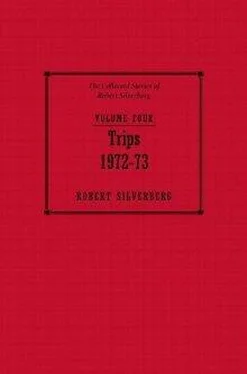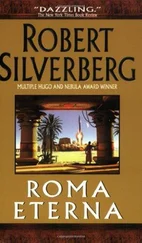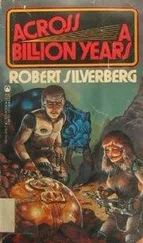Robert Silverberg - Getting Across
Здесь есть возможность читать онлайн «Robert Silverberg - Getting Across» весь текст электронной книги совершенно бесплатно (целиком полную версию без сокращений). В некоторых случаях можно слушать аудио, скачать через торрент в формате fb2 и присутствует краткое содержание. Год выпуска: 2009, ISBN: 2009, Издательство: Subterranean Press, Жанр: Фантастика и фэнтези, на английском языке. Описание произведения, (предисловие) а так же отзывы посетителей доступны на портале библиотеки ЛибКат.
- Название:Getting Across
- Автор:
- Издательство:Subterranean Press
- Жанр:
- Год:2009
- ISBN:978-1-59606-212-2
- Рейтинг книги:5 / 5. Голосов: 1
-
Избранное:Добавить в избранное
- Отзывы:
-
Ваша оценка:
- 100
- 1
- 2
- 3
- 4
- 5
Getting Across: краткое содержание, описание и аннотация
Предлагаем к чтению аннотацию, описание, краткое содержание или предисловие (зависит от того, что написал сам автор книги «Getting Across»). Если вы не нашли необходимую информацию о книге — напишите в комментариях, мы постараемся отыскать её.
Getting Across — читать онлайн бесплатно полную книгу (весь текст) целиком
Ниже представлен текст книги, разбитый по страницам. Система сохранения места последней прочитанной страницы, позволяет с удобством читать онлайн бесплатно книгу «Getting Across», без необходимости каждый раз заново искать на чём Вы остановились. Поставьте закладку, и сможете в любой момент перейти на страницу, на которой закончили чтение.
Интервал:
Закладка:
At nightfall I go to the soulfather’s house, in the shadow of Ganfield Tower. To leave without a blessing seems unwise. But there is something stagy and unspontaneous about my visit, and my faith flees as I enter. In the dim antechamber I light the nine candles, I pluck the five blades of grass from the ceremonial vase, I do the other proper ritual things, but my spirit remains chilled and hollow, and I am unable to pray. The soulfather himself, having been told of my mission, grants me audience—gaunt old man with impenetrable eyes set in deep bony rims—and favors me with a gentle feather-light embrace. “Go in safety,” he murmurs. “God watches over you.” I wish I felt sure of that. Going home, I take the most roundabout possible route, as if trying to drink in as much of Ganfield as I can on my last night. The diminishing past flows through me like a river running dry. My birthplace, my school, the streets where I played, the dormitory where I spent my adolescence, the home of my first month-wife. Farewell. Farewell. Tomorrow I go across. I return to my apartment alone; once more my sleep is fitful; an hour after dawn I find myself, astonished by it, waiting in line among the commuters at the mouth of the transit tube, bound for Conning Town. And so my crossing begins.
6.
Aboard the tube no one speaks. Faces are tense, bodies are held rigid in the plastic seats. Occasionally someone on the other side of the aisle glances at me as though wondering who this newcomer to the commuter group may be, but his eyes quickly slide away as I take notice. I know none of these commuters, though they must have dwelled in Ganfield as long as I; their lives have never intersected mine before. Engineers, merchants, diplomats, whatever—their careers are tied to districts other than their own. It is one of the anomalies of our ever more fragmented and stratified society that some regular contact still survives between community and community; a certain number of people must journey each day to outlying districts, where they work encapsulated, isolated, among unfriendly strangers.
We plunge eastward at unimaginable speed. Surely we are past the boundaries of Ganfield by now and under alien territory. A glowing sign on the wall of the car announces our route: CONNING TOWN-HAWK NEST-OLD GROVE-KINGSTON-FOLKSTONE-PARLEY CLOSE-BUDLEIGH-CEDAR MALL-THE MILL-MORTON COURT-GANFIELD, a wide loop through our most immediate neighbors. I try to visualize the separate links in this chain of districts, each a community of three or four hundred thousand loyal and patriotic citizens, each with its own special tone, its flavor, its distinctive quality, its apparatus of government, its customs and rituals. But I can imagine them merely as a cluster of Ganfields, every place very much like the one I have just left. I know this is not so. The world-city is no homogenous collection of uniformities, a global bundle of indistinguishable suburbs. No, there is incredible diversity, a host of unique urban cores bound by common need into a fragile unity. No master plan brought them into being; each evolved at a separate point in time, to serve the necessities of a particular purpose. This community sprawls gracefully along a curving river, that one boldly mounts the slopes of stark hills; here the prevailing architecture reflects an easy, gentle climate, there it wars with unfriendly nature; form follows topography and local function, creating individuality. The world is a richness: why then do I see only ten thousand Ganfields?
Of course it is not so simple. We are caught in the tension between forces which encourage distinctiveness and forces compelling all communities toward identicality. Centrifugal forces broke down the huge ancient cities, the Londons and Tokyos and New Yorks, into neigh-borhood communities that seized quasi-autonomous powers. Those giant cities were too unwieldy to survive; density of population, making long-distance transport unfeasible and communication difficult, shattered the urban fabric, destroyed the authority of the central government, and left the closely knit small-scale subcity as the only viable unit. Two dynamic and contradictory processes now asserted themselves. Pride and the quest for local advantage led each community toward specialization: this one a center primarily of industrial production, this one devoted to advanced education, this to finance, this to the processing of raw materials, this to wholesale marketing of commodities, this to retail distribution, and so on, the shape and texture of each district defined by its chosen function. And yet the new decentralization required a high degree of redundancy, duplication of governmental structures, of utilities, of community services; for its own safety each district felt the need to transform itself into a microcosm of the former full city. Ideally we should have hovered in perfect balance between specialization and redundancy, all communities striving to fulfil the needs of all other communities with the least possible overlap and waste of resources; in fact, our human frailty has brought into being these irreversible trends of rivalry and irrational fear, dividing district from district, so that against our own self-interest we sever year after year our bonds of interdependence and stubbornly seek self-sufficiency at the district level. Since this is impossible, our lives grow constantly more impoverished. In the end all districts will be the same and we will have created a world of pathetic limping Ganfields, devoid of grace, lacking in variety.
So. The tube-train halts. This is Conning Town. I am across the first district line. I make my exit in a file of solemn-faced commuters. Imitating them, I approach a colossal cyclopean scanning machine and present my passport. It is unmarked by visas; theirs are gaudy with scores of them. I tremble, but the machine accepts me and slams down a stamp that fluoresces a brilliant shimmering crimson against the pale lavender page:
DISTRICT OF CONNING TOWN
ENTRY VISA
24-HOUR VALIDITY
Dated to the hour, minute, second. Welcome, stranger, but get out of town before sunrise!
Up the purring ramp, into the street. Bright morning sunlight pries apart the slim sooty close-ranked towers of Conning Town. The air is cool and sweet, strange to me after so many sweltering days in programless demechanized Ganfield. Does our foul air drift across the border and offend them? Sullen eyes study me; those about me know me for an outsider. Their clothing is alien in style, pinched in at the shoulders, flaring at the waist. I find myself adopting an inane smile in response to their dour glares.
For an hour I walk aimlessly through the downtown section until my first fears melt and a comic cockiness takes possession of me: I pretend to myself that I am a native, and enjoy the flimsy imposture. This place is not much unlike Ganfield, yet nothing is quite the same. The sidewalks are wider; the street lamps have slender arching necks instead of angular ones; the fire hydrants are green and gold, not blue and orange. The police machines have flatter domes than ours; ringed with ten or twelve spy-eyes where ours have six or eight. Different, different, all different.
Three times I am halted by police machines. I produce my passport, display my visa, am allowed to continue. So far getting across has been easier than I imagined. No one molests me here. I suppose I look harmless. Why did I think my foreignness alone would lead these people to attack me? Ganfield is not at war with its neighbors, after all.
Drifting eastward in search of a bookstore, I pass through a shabby residential neighborhood and through a zone of dismal factories before I reach an area of small shops. Then in late afternoon I discover three bookstores on the same block, but they are antiseptic places, not the sort that might carry subversive propaganda like Walden Three. The first two are wholly automated, blank-walled charge-plate-and-scanner operations. The third has a human clerk, a man of about thirty with drooping yellow mustachios and alert blue eyes. He recognizes the style of my clothing and says, “Ganfield, eh? Lot of trouble over there.”
Читать дальшеИнтервал:
Закладка:
Похожие книги на «Getting Across»
Представляем Вашему вниманию похожие книги на «Getting Across» списком для выбора. Мы отобрали схожую по названию и смыслу литературу в надежде предоставить читателям больше вариантов отыскать новые, интересные, ещё непрочитанные произведения.
Обсуждение, отзывы о книге «Getting Across» и просто собственные мнения читателей. Оставьте ваши комментарии, напишите, что Вы думаете о произведении, его смысле или главных героях. Укажите что конкретно понравилось, а что нет, и почему Вы так считаете.












